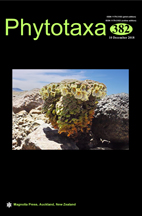Abstract
Arthrinium (Apiosporaceae) and Didymella (Didymellaceae) are species-rich genera and most of the members in these genera are plant pathogenic, saprobic or endophytic species that have been recorded from a wide range of hosts. The present study introduces Didymella eriobotryae sp. nov. and a new record of Arthrinium arundinis which are associated with decaying fruit of Eriobotrya japonica in China. Morphology and DNA sequence data are employed to determine the taxonomic placement of these species.

